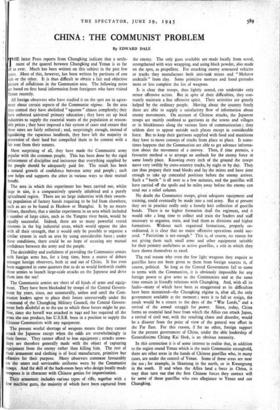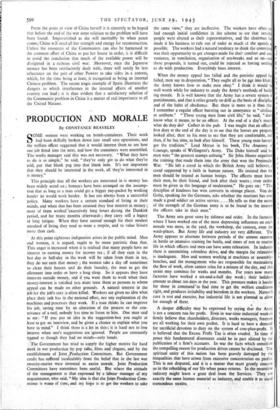CHINA : THE COMMUNIST PROBLEM
By EDWARD DALE
HE latest Press reports from Chungking indicate that a settle- ment of the quarrel between Chungking and Yenan is as far off as ever. Much has been written on this subject in the past few years. -Most of this, however, has been written by partisans of one side or the other. It is thus difficult to obtain a fair and objective picture of cotditions in the Communist area. The following notes are based on first hand information from foreigners who have visited Yenan recently.
All foreign observers who have studied it on the spot are in agree- ment about certain aspects of the Communist regime. In the area they control they have abolished " squeeze " almost completely; they have enforced universal primary education ; they have set up local industries to supply the essential wants of the population at reason- able prices ; they have imposed a fair system of taxes and ensure that these taxes are fairly collected ; and, surprisingly enough, instead of liquidating the rapacious landlords, they have left the majority in possession- of their land but compelled them to be content with a fair rent from their tenants.
Most surprising of all, they have made the Communist army popular with the common people. This has been done by the rigid enforcement of discipline and insistence that everything supplied by the people should be adequately paid for. The result has been a natural growth of confidence between army and people ; each now helps and supports the other in various ways to their mutual benefit.
The area in which this experiment has been carried out, whilst large in size, is a comparatively sparsely inhabited and a purely agricultural region. There are no large industries with their swarm- ing population of factory hands requiring to be fed from elsewhere, such as are to be found in Hankow or Shanghai. It by no means follows, therefore, that a similar experiment in an area which included 3 number of large cities, such as the Yangtze river basin, would be equally successful. Indeed, there are so many powerful vested interests in the big industrial areas, which would oppose the idea with all their strength, that it would only be possible to organise a similar system in such an area by using considerable force ; under these conditions, there could be no hope of securing any mutual
confidence between the army and the people. •
The desirability and usefulness of providing the Communist armies with foreign arms has, for a long time, been a source of debate amongst foreign observers, both in and out of China. It has even been suggested in some quarters that to do so would forthwith enable these armies to launch large-scale attacks on the Japanese and drive them into the sea!
The Communist armies are short of all kinds of arms and equip- ment. They have been blockaded by troop; of the Central Govern- ment for years, since, not unnaturally, unless and until the Com- munist leaders agree to place their forces unreservedly under the command of the Chungking Military Council, the Central Govern- ment feels ctubtful as to the use to which these forces might be put. Nor, since she herself was attacked in 1941 and has required all the arms she can produce, has U.S.S.R. been in a position to supply the Chinese Communists with any equipment.
The present woeful shortage of weapons means that they cannot
attack the Japanese except when the odds are overwhelmingly in their favour. They cannot afford to lose equipment ; attacks nowa- days are therefore generally made with the object of capturing equipment from the enemy rather than killing him. The rest of their armament and clothing is of local manufacture, primitive but effective for their purpose. Many observers comment favourably on the smart and serviceable uniforms worn by the Communist troops. And the skill of the back-room boys who design locally made weapons is in character with Chinese genius for improvisation.
Their armament includes various types of rifle, together with a few machine guns, the majority of which have been captured from •
the enemy. The only guns available are made locally from wood, strengthened with wire wrapping, and using black powder, also made on the.spot, as propellent. For attacking enemy armoured vehicles or trucks they manufacture both anti-tank mines and "Molotov cocktails" from clay. Some primitive mortars and hand grenades more or less complete the list of weapons.
It is clear that troops, thus lightly armed, can undertake only minor offensive action. But in spite of their difficulties, they con- stantly maintain a fine offensive spirit. Their activities are greatly - helped by the ordinary people. Moving about the country freely these are able to supply a satisfactory flow of information about enemy movements. On account of Chinese attacks, the Japanese troops are mainly confined to garrisons in the towns and villages or in blockhouses along the various lines of communication ; they seldom dare to appear outside such places except in considerable force. But to keep their garrisons supplied with food and munitions they have to move convoys of trucks from place to place. It some- times happens that the Communists are able to get advance informa- tion about the movement of a convoy. Then, if time permits, a favourite method is to arrange an ambush for the enemy force in some lonely place. Knowing every inch of the ground the troops move very swiftly by cross-country tracks, by night or by day. They can thus prepare their road blocks and lay the mines and have time enough to take up concealed positions before the enemy arrives. Such a " battle " is all over in a few minutes, and the guerillas will have carried off the spoils and be miles away before the enemy can send out a relief column.
No doubt the Communist troops, given adequate equipment and training, could eventually be made into a real army. But at present they are in practice really only a loosely knit collection of guerilla bands. There is no higher formation than the regiment, and it would take a long time to collect and train the leaders and staff necessary to organise, train, and lead them as divisions and higher formations. Without such organised formations, properly co- ordinated, it is clear that no major offensive operations could suc- ceed. "Patriotism is not enough." This is, of course, no reason for not giving them such small arms and other equipment suitable for their primary usefulness as active guerillas, a role in which they have shown themselves to excel.
The real reason why even the few light weapons they require as guerillas have not been given to them from foreign sources is, of course, political. So long as the Central Government fail to come to terms with the Communists, it is obviously impossible for any foreign power to give arms to the Communists and at the same time remain in friendly relations with Chungking. And, with all its faults—many of which have been as exaggerated as its difficulties have been minimised—the Chungking regime is, after all, the only government available at the moment ; were it to fall or resign, the result would be a return to the days of the "War Lords," and a revival of the armed struggle for power. Since, today, China forms an essential land base from which the Allies can attack Japan, a revival of civil war, with the resulting chaos and disorder, would be a disaster from the point of view of the general war effort in the Far East. For this reason, if for no other, foreign support for the present government of China, under the able leadership of Generalissimo Chiang Kai Shek, is an obvious necessity.
In this connection it is of some interest to realise that, in addition to the region round Yenan which is the main Communist stronghold, there are other areas in the hands of Chinese guerillas who, in many cases, are under the control of Yenan. Some of these areas are near the sea ; for example, in Shantung in the north, or in Kwangtung in the south. If and when the Allies land a force in China, it may thus turn out that the first Chinese forces they contact will be some of those guerillas who owe allegiance to Yenan and not Chungking.
From the point of view of China herself it is sincerely to be hoped that before the end of the war some solution to the problem will have been found. Impoverished as she will mevitably be when peace comes, China w:11 need all her strength and energy for reconstruction. Unless 'the resources of the Communists can also be harnessed to the common effort of China to put her house in order, it is difficult to avoid the conclusion that much of the available power will be dissipated in a ruinous civil war. Moreover, once the Japanese menace has been satisfactorily dealt with, there will surely be less reluctance on the part of other Powers to take sides in. a contest, which, for the time being at least, is recognised as being an internal Chinese problem. The recent tragic example of Spain illustrates the dangers to which interference in the internal affairs of another country can lead ; it is thus evident that a satisfactory solution of the Communist problem in China is a matter of real importance to all the United Nations.



























 Previous page
Previous page